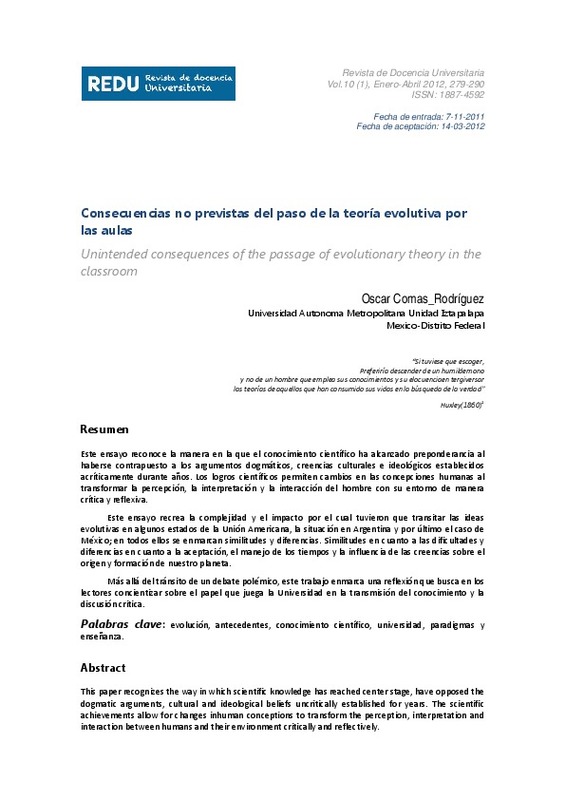JavaScript is disabled for your browser. Some features of this site may not work without it.
Buscar en RiuNet
Listar
Mi cuenta
Estadísticas
Ayuda RiuNet
Admin. UPV
Consecuencias no previstas del paso de la teoría evolutiva por las aulas
Mostrar el registro sencillo del ítem
Ficheros en el ítem
| dc.contributor.author | Comas Rodriguez, Oscar Jorge
|
es_ES |
| dc.date.accessioned | 2020-04-21T11:59:38Z | |
| dc.date.available | 2020-04-21T11:59:38Z | |
| dc.date.issued | 2012-04-24 | |
| dc.identifier.issn | 1887-4592 | |
| dc.identifier.uri | http://hdl.handle.net/10251/141095 | |
| dc.description.abstract | [ES] Este ensayo reconoce la manera en la que el conocimiento científico ha alcanzado preponderancia al haberse contrapuesto a los argumentos dogmáticos, creencias culturales e ideológicos establecidos acríticamente durante años. Los logros científicos permiten cambios en las concepciones humanas al transformar la percepción, la interpretación y la interacción del hombre con su entorno de manera crítica y reflexiva. Este ensayo recrea la complejidad y el impacto por el cual tuvieron que transitar las ideas evolutivas en algunos estados de la Unión Americana, la situación en Argentina y por último el caso de México; en todos ellos se enmarcan similitudes y diferencias. Similitudes en cuanto a las dificultades y diferencias en cuanto a la aceptación, el manejo de los tiempos y la influencia de las creencias sobre el origen y formación de nuestro planeta. Más allá del tránsito de un debate polémico, este trabajo enmarca una reflexión que busca en los lectores concientizar sobre el papel que juega la Universidad en la transmisión del conocimiento y la discusión critica. | es_ES |
| dc.description.abstract | [EN] This paper recognizes the way in which scientific knowledge has reached center stage, have opposed the dogmatic arguments, cultural and ideological beliefs uncritically established for years. The scientific achievements allow for changes inhuman conceptions to transform the perception, interpretation and interaction between humans and their environment critically and reflectively. This essay re‐creates the complexity and impact for which they had to move evolutionary ideas in some states of the American Union, the situation in Argentina and finally the case of Mexico, which all fall similarities and differences. Similarities in the difficulties and differences in the acceptance, management of time and the influence of beliefs about the origin and formation of our planet. Beyond the passage of a controversial debate, this paper frames a reflection that searches there adersaw are of the role played by the University in the transmission of knowledge and critical discussion. | es_ES |
| dc.language | Español | es_ES |
| dc.publisher | Universitat Politècnica de València | es_ES |
| dc.relation.ispartof | REDU. Revista de Docencia Universitaria | es_ES |
| dc.rights | Reconocimiento - No comercial - Sin obra derivada (by-nc-nd) | es_ES |
| dc.subject | Evolution | es_ES |
| dc.subject | History | es_ES |
| dc.subject | Scientific knowledge | es_ES |
| dc.subject | University | es_ES |
| dc.subject | Paradigms and teaching | es_ES |
| dc.subject | Evolución | es_ES |
| dc.subject | Antecedentes | es_ES |
| dc.subject | Conocimiento científico | es_ES |
| dc.subject | Universidad | es_ES |
| dc.subject | Paradigmas | es_ES |
| dc.subject | Enseñanza | es_ES |
| dc.title | Consecuencias no previstas del paso de la teoría evolutiva por las aulas | es_ES |
| dc.title.alternative | Unintended consequences of the passage of evolutionary theory in the classroom | es_ES |
| dc.type | Artículo | es_ES |
| dc.identifier.doi | 10.4995/redu.2012.6132 | |
| dc.rights.accessRights | Abierto | es_ES |
| dc.description.bibliographicCitation | Comas Rodriguez, OJ. (2012). Consecuencias no previstas del paso de la teoría evolutiva por las aulas. REDU. Revista de Docencia Universitaria. 10(1):279-290. https://doi.org/10.4995/redu.2012.6132 | es_ES |
| dc.description.accrualMethod | OJS | es_ES |
| dc.relation.publisherversion | https://doi.org/10.4995/redu.2012.6132 | es_ES |
| dc.description.upvformatpinicio | 279 | es_ES |
| dc.description.upvformatpfin | 290 | es_ES |
| dc.type.version | info:eu-repo/semantics/publishedVersion | es_ES |
| dc.description.volume | 10 | es_ES |
| dc.description.issue | 1 | es_ES |
| dc.identifier.eissn | 1887-4592 | |
| dc.relation.pasarela | OJS\6132 | es_ES |
| dc.description.references | Asimov, I. (2007). Historia y cronología de la ciencia y los descubrimientos: Cómo la ciencia ha dado forma a nuestro mundo.Barcelona: Ariel. | es_ES |
| dc.description.references | Candelas, F. (2009). La Evolución, de Darwin al genoma. España: Sin fronteras. | es_ES |
| dc.description.references | Eicher, L. (1968). Geologic Time. New Jersey: Foundations of Earth Science Series. | es_ES |
| dc.description.references | Fourez G. (1994). La construcción del conocimiento científico. Madrid: Narcea. | es_ES |
| dc.description.references | Kuhn, T. (1971). La estructura de las revoluciones científicas. México: Fondo de Cultura Económica. | es_ES |
| dc.description.references | Marvin, H. (2005). De pie por nosotros mismos. En E. Paul, Human Natures, Genes, Cultures and the Human Prospect (p.145‐146). México: FCE. | es_ES |
| dc.description.references | Pelayo, F. (2001). De la creación a la evolución Darwin. España. P. 139. | es_ES |
| dc.description.references | Ponce, A. (1985). Los deberes de la Inteligencia: I. De los deberes consigo mismo. En I. A. Carolina, Doce textos argentinos sobre educación. México: Consejo Nacional de Fomento Educativo. | es_ES |
| dc.description.references | Schoijet M. (2008) El fundamentalismo protestante y la resistencia tardía contra la teoría de la evolución en Estados Unidos. Estudios Sociales Nueva Época,4. Departamento de Estudios de la Cultura Regional del Centro Universitario de Ciencias Sociales y Humanidades de la Universidad de Guadalajara. | es_ES |
| dc.description.references | Torres, L. (1995). En el nombre de Darwin. México: Fondo de Cultura Económica. | es_ES |








